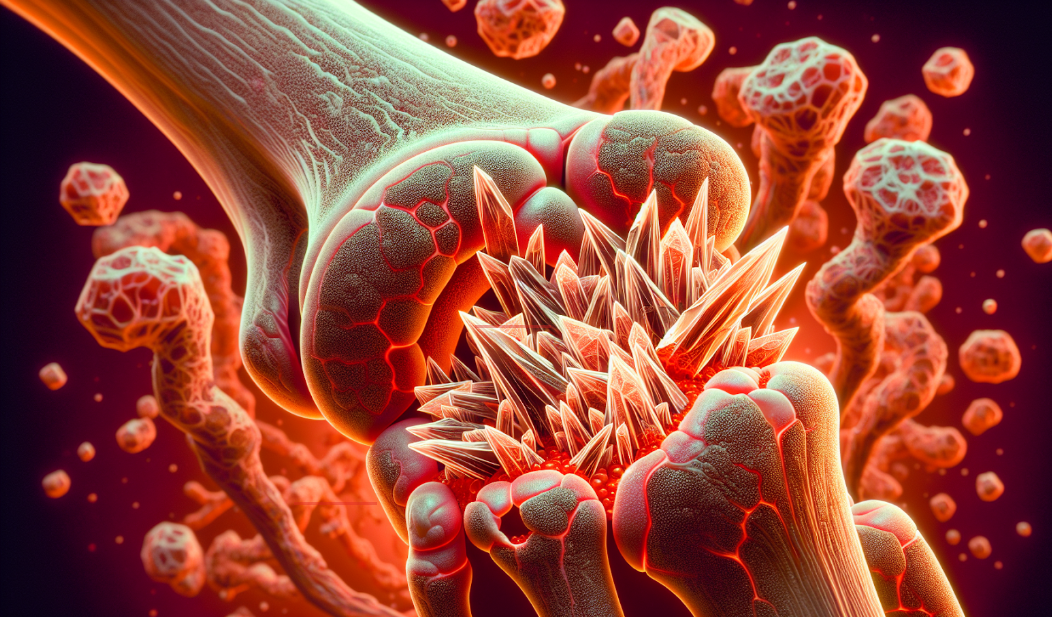Want to manage high uric acid levels naturally? Homeopathic medicine for uric acid has various treatments to help reduce uric acid levels and symptoms of hyperuricemia like gout and kidney problems.
Explore with us some of the homeopathic remedies like Benzoic Acid, Colchicum and others that are recommended for uric acid balance and how combining these holistic alternatives with lifestyle changes can benefit you.
Quick Facts
- Hyperuricemia can lead to gout and kidney disease due to diet, alcohol, health conditions and metabolic issues like hyperinsulinemia.
- Homeopathic remedies like Benzoic Acid, Colchicum and others can manage uric acid levels and symptoms but treatment must be individualized based on symptoms and health history.
- Lifestyle changes like dietary modifications, proper hydration, regular exercise and stress management are essential in managing uric acid levels and preventing gout which can be complemented by homeopathic treatments.
Also Read: Homeopathic Medicine for Psoriasis; Homeopathy for ADHD; Homeopathy for Diabetes
Understanding Uric Acid and Its Effects on Health

Found in the blood and urine of humans, uric acid is a byproduct of purine breakdown that acts as an antioxidant to protect our bodies from free radicals. Hyperuricemia occurs when there’s overproduction or inadequate elimination of uric acid. Although this excess uric acid in the blood stream may not manifest symptoms at first but can lead to gout or kidney disease if ignored.
| Uric Acid Level | Males | Females |
| Normal | 3.5 to 7.2 milligrams per deciliter (mg/dL) | 2.6 to 6.0 milligrams per deciliter (mg/dL) |
| Low | Below 3.5 milligrams per deciliter (mg/dL) | Below 2.6 milligrams per deciliter (mg/dL) |
| High | Above 7.2 milligrams per deciliter (mg/dL) | Above 6.0 milligrams per deciliter (mg/dL) |
Symptoms of High Uric Acid
High uric acid shows up as joint pain which is gouty arthritis and kidney stones that cause discomfort and swelling. If left untreated high uric acid can lead to many health complications like gout, uric acid nephrolithiasis (kidney stone formation), high blood pressure, ongoing kidney disease and heart problems.
Gout is associated with high uric acid in the body and Subsides within a one to two week period with proper medical care. But high uric acid persistently can cause frequent gout attacks. If left unchecked over time this can damage the joints permanently due to these recurring episodes of pain and inflammation caused by excess urate crystals.
Risk Factors for High Uric Acid in Blood
Nutrition plays a big role in the production of uric acid especially when it comes to foods high in purines like:
- liver
- anchovies
- red meat
- seafood
- beer
Reducing the intake of these foods and alcohol can help decrease uric acid and gout attacks.
Note that intense physical activity can increase serum uric acid levels. Moderate exercise is not associated with this effect.
Also Read: Homeopathic Medicines for Low BP (Hypotension); Homeopathic Medicine for Allergic Cold and Cough; Homeopathic Medicine for High Uric Acid

Homeopathic Remedies for Uric Acid Imbalance
Homeopathy is a great defense against high uric acid. This approach has multiple remedies that can lower high uric acid and its symptoms. Its strength lies in its holistic approach that assesses not only the symptoms but the whole person. Thus it gives comprehensive care to the underlying cause rather than just the symptoms.
Homeopathic Medicines for Uric Acid
Benzoic Acid and Colchicum are the homeopathic remedies that can regulate uric acid. The choice of remedy depends on the symptoms and the affected parts of the body. For example Benzoic Acid is used for kidney problems and Colchicum for toe joint problems. They work by modulating the metabolism of uric acid and reducing the creation and crystallization of excess uric acid in the body.
Also Read: Top 15 Homeopathic Medicines for Migraine; Homeopathy Medicine For Hair Fall and Regrowth; Homeopathic Remedies for Tinnitus Relief
How Homeopathy Addresses Joint Pain and Inflammation

Homeopathy has many remedies that directly address joint inflammation and the pain that comes with it. Here are some examples:
- Ledum Palustre
- Colchicum
- Bryonia
- Rhus toxicodendron
- Arnica
For instance, colchicum has been found to interrupt the activation of inflammasomes that are involved in inflammatory processes and thus reduce swelling. Urtica Urens is another remedy that is known to reduce the burning sensation that comes with high uric acid.
Clinical data shows that people who received homeopathic treatment for gout related distress had significant relief of symptoms like joint pain and edema and had about 50% improvement in their condition.
Homeopathy and Lifestyle Changes
Combining homeopathy with lifestyle changes can greatly control uric acid levels. The best results are seen when these changes are done along with the homeopathic treatment.
- Diet changes
- Adequate water intake
- Regular exercise
- Stress control
Indeed, a permanent change in diet is crucial to control high uric acid and gout.
These proactive measures that involve continuous changes in one’s lifestyle reduces uric acid from the blood and also reduces the chances of getting gout and is a long term solution for it.
Dietary Changes to Reduce Uric Acid
Nutrition is key to controlling uric acid. Consuming purine rich foods like organ meats, red meat and some types of fish can increase uric acid levels. So it’s best to avoid them. Alcohol and beverages with high fructose corn syrup also increases uric acid levels and should be minimized.
Hydration and Weight Management
Adequate hydration is key to preventing gout flare ups and is inversely proportional to uric acid levels. Drinking enough water reduces serum uric acid levels and helps eliminate excess uric acid.Regular exercise and low calorie/carb diet is the proven way to lose weight which in turn helps to regulate serum urate levels. For those with high uric acid, it’s best to focus on maintaining ideal body weight through diet and physical activity as this addresses both overproduction and under excretion of uric acid.
Also Read: Homeopathic Treatment for Corns and Calluses; Homeopathic Medicines for Piles and Fissure; Benefits of Drinking Green Tea on Empty Stomach
Exercise and Stress Reduction Techniques

Exercise and Stress Reduction Techniques
Regular low to moderate intensity exercise such as walking, cycling and swimming can help regulate body weight and reduce uric acid in the blood. Exercise also prevents uric acid crystals from forming in the joints which is good for gout sufferers. Avoiding foods and practices that increase uric acid is crucial for healthy levels.
After a gout attack, gentle exercises like walking or swimming is recommended as these have minimal impact on the joints. High intensity workouts like HIIT or sprinting should be avoided as they can increase uric acid in your system and trigger a gout attack.
Personalizing Your Homeopathic Treatment Plan
Homeopathic treatment is not one size fits all. It requires an individualized approach that takes into account the physical, mental and emotional well being of each patient to formulate a personalized treatment plan. By looking at and understanding the totality of a patient’s health and lifestyle, this customized plan ensures the homeopathic regimen given is more targeted to the individual.
Medical History in Homeopathic Medicine
Homeopaths ask a lot of questions about a patient’s medical history to customize their treatment. The information about past health issues obtained from the patient’s medical history is used to select the homeopathic remedy.
The understanding of an individual’s medical background is more than just a basis for medication selection. It’s the key to long term effectiveness in homeopathic treatment.
Duration and Expectations of Homeopathic Treatment for Uric Acid
Homeopathic treatment activates the body’s natural healing ability to correct the imbalance of uric acid. The benefits of using homeopathic remedies to manage uric acid levels are:
- Reduction of symptoms by 50% within several months of treatment
- Some people feel better within weeks of treatment
- Some may take longer to notice changes
Remember individual results of improving uric acid levels through homeopathy can vary from person to person.
Getting to the Root of the Problem: Homeopathy’s Holistic Approach
Homeopathy addresses uric acid levels by getting to the root of the problem rather than just the symptoms. In homeopathy, individualising treatment to symptoms and patterns unique to each person is key to tackling the underlying health issue. The main aim of homeopathic management of high uric acid is to balance and overall well being by addressing the root cause.
Homeopathic treatment goes beyond just temporary relief. It seeks deep and lasting change by correcting the underlying cause of high uric acid.
Summary
In short, managing uric acid levels requires a holistic approach that combines lifestyle changes with homeopathic remedies. Recognising symptoms and understanding the biological basis of uric acid and its risk factors is key to controlling it. Homeopathy offers individualised treatments which when combined with lifestyle changes give an overall solution to uric acid imbalances. Remember achieving health is a marathon not a sprint. Every step forward gets you closer to your goal.
Also Read: Homeopathy for Stress and Anger; 20 Benefits of Healthy Eating
Frequently Asked Questions
What is uric acid and why is it important to manage its levels?
Managing levels of uric acid is crucial since elevated amounts can lead to health complications such as gout or kidney disease. This compound, which serves as an antioxidant in our system, results from the breakdown of purines during metabolism.
How does homeopathy help in managing uric acid levels?
Homeopathy presents an array of options that may assist in reducing levels of uric acid and alleviating associated symptoms, suggesting a viable path to consider for the control of uric acid levels.
Can lifestyle modifications support homeopathic treatment for uric acid regulation?
Indeed, adapting one’s lifestyle through altering their diet, ensuring adequate hydration, maintaining regular physical activity and controlling stress is crucial in regulating uric acid levels alongside the integration of homeopathic treatments.
How is a homeopathic treatment plan personalized?
During a comprehensive consultation that evaluates the emotional, mental, and physical health of the patient as well as their lifestyle habits, a customized homeopathic treatment strategy is devised.
What is the duration and expectation of homeopathic treatment for uric acid?
Homeopathic therapy aimed at treating uric acid levels may result in incremental health improvement, with certain individuals observing symptom alleviation within several months. The timeframe for this improvement is subjective and differs from person to person.

